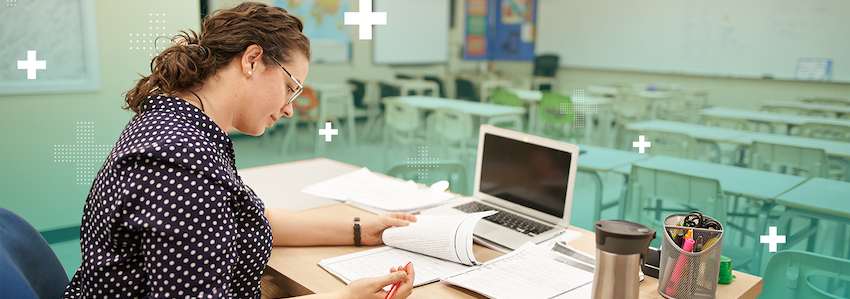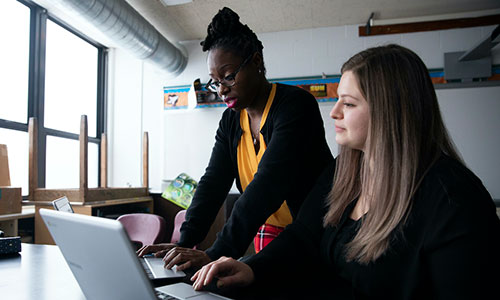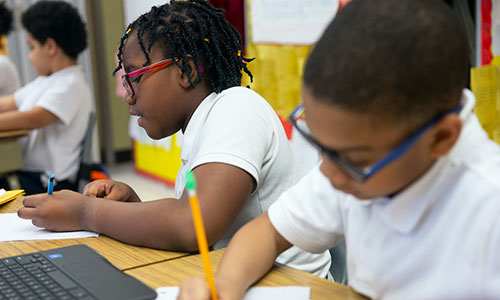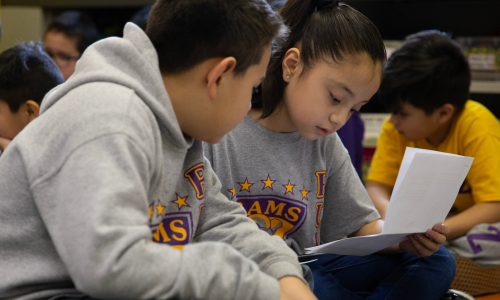
We need to put more relating back into relationships. More specifically, we need to invest in helping educators build meaningful professional relationships with each other and with themselves. As I explain in my new book, The Equity Expression: Six Entry Points for Nonnegotiable Academic Success, relationships are an entry point for building equity in schools that can support students’ growth and advancement.
I’m a relationship person. I go out of my way to relate with my colleagues on a personal level, to ask them how they are, to get to know them. This has helped me find meaning in my work and be more effective at my job. I know this comes easily to me but that it may be very challenging for others.
I thought about the importance of professional relationships a lot when I was writing my book and again recently, when I attended an educator event.
A group of teachers walk into a conference…
At a recent conference, I got the chance to network with a group of teachers. One of them dominated the conversation, using the word “I” repeatedly. When the group finished talking, I asked her how she might collaborate with us in the future. She didn’t have an answer. I suspect part of why is because she didn’t give herself a chance to get to know the people she’d been talking to. She had spent thirty minutes with a group of strangers, which takes courage, but she had also spent most of the time talking about herself. It seemed to me she had made little effort to build a relationship with her fellow educators.
There are many reasons this may have happened. This teacher may experience social anxiety, which manifests in nervous monologuing. She may be neurodivergent. She may have never been encouraged to use conversations as an opportunity to connect to others. Whatever the cause, this teacher is obviously not a bad or even a flawed person. Like many of us, she’s just someone who missed an opportunity to focus on relationship building.
Meaningful relationships with colleagues and ourselves are critical
Fostering professional relationships is an essential part of equity work.
Equity work is challenging, and we often take several steps back for every one or two we take forward. We can’t do this work alone; we need one another. When we build strong relationships with each other, we make it easier to work toward equity, which, in turn, supports our students.
Equity and relationships in K–12 education is a multilayered topic. Most discussions around equitable relationships center on race and cultural relevance, also called culturally responsive teaching, and have race and culture as a focal point for dissecting how teachers relate to their students. There’s plenty of research and support (Multicultural Education: Issues and Perspectives is just one example) for how to address these issues, but I want to highlight an overlooked area of importance: relationships with other educators and with yourself.
Building strong professional relationships with other educators and yourself is important because it helps us feel more psychologically safe with one another and builds a collegial trust and assurance that we can rely on one another. Everyone needs to feel safe when discussing highly charged topics around equity.
Three ways to build professional relationships
I know you might not be feeling all the way okay right now. You might feel burned out, overworked, and overwhelmed. The pandemic created an urgency to shift how we do schooling, and being an educator was challenging long before that. Where are you supposed to even find the time to build relationships?
I believe relationship building is about taking small actions consistently, not about making a huge, time-consuming shift. I believe any type of big goal should be given ample time so that you can be successful. If you’re commited to focusing on your professional relationships, I encourage you to think of this as a year-long project, one you can start thinking about now and begin implementing when the new school year starts. Here are three things to focus on.
1. Create your community
I encourage you to elect two trusted partners with whom you can process, reflect, and make sense of your thoughts, actions, behaviors, teaching materials, and instructional practices. This will ensure you have support along your teaching journey. Select two different types of trusted partners: a 180o partner and a 360o partner, both of whom know what it’s like to be a teacher and neither of whom evaluate or assess your performance.
Your 180o partner should be a person you imagine to be 180o degrees different from you. Perhaps they’re different in upbringing, cultural experiences, or even the subject they teach. If you’ve been an elementary school math teacher for two years, for example, your 180o partner may be a veteran high school English teacher. The purpose of this partner is to allow you to engage in conversation where you can learn from the insights and experiences of someone different from you.
Your 360o partner should be a person you imagine to be very similar to you. They are aligned in what you teach, your cultural experiences or background, and interests. If you teach sixth-grade science, your 360o partner might be the eighth-grade science teacher at your school. The purpose of your 360o partner is to allow you to engage in conversations that are easier because you have a lot of common ground.
Both of your partners will be people you will learn from (and they will learn from you). Through honest, authentic conversations, you can embrace diversity as you learn more about one another and deepen your self-awareness and empathy.
2. Cultivate collaborative learning spaces
Consider all the professional development spaces in which you gather with educator colleagues: trainings, workshops, professional learning communities, webinars, staff and grade-level team meetings, continuing education courses, and more. These provide a continuous growth opportunity to develop skills and knowledge that will help make you a better teacher.
One way to cultivate a collaborative learning space is to identify potential 180o and 360o partners when you engage in professional learning. These individuals can help you think and talk about a session specifically, not necessarily your practice as a whole, like the partners I mentioned earlier should do. Ask potential partners if they’d be willing to continue learning with you by debriefing after the workshop or other professional learning experience.
Imagine what is possible when you think of relationships with fellow educators as more than just being colleagues. Imagine that your relationships make up collaborative learning spaces where you work alongside your peers not only to learn more about the subject you teach, how to best teach it, and how to know what learners need, but also to foster safe and brave spaces for equity conversations where critical thinking occurs and new thoughts are explored.
3. Commit to self-reflection
It’s also critical to consider the most important relationship you will ever have: the one you have with yourself. It’s easy to define a professional relationship between you and others because it’s usually driven by roles (I teach my students), agreements (the building service worker cleans my classroom at the end of each day), or commonalities (we’re the science team). The relationship with yourself is defined by the extent to which you are true to who you are and your willingness to grow and change.
It’s important that you’re clear about who you are, what you believe, and your impact on the relationships you have with others. The relationship you have with yourself affects others as much as it affects you.
If you’re looking for a way to learn how to become a more self-reflective educator, my book is packed with exercises that will help you get started.
You are amazing
Teaching is hard work. I don’t need to tell you that. But you might be underestimating how important relationships can be.
I doubt I would have thrived during my teaching career without the community I created and cultivated. I formed connections with my grade-level team members. I engaged with my mentor and instructional coach at least once a week. And I found community within myself by making self-reflection a regular practice.
Each of my professional relationships gave me the space to consciously complain and try to make sense of all that I had to manage as a teacher, particularly things that pained me or that I found challenging. Talking my thoughts out helped me to identify my feelings so that I could teach from a space of clarity and confidence, rather than confusion.
You, too, need the time and space to bring awareness to how you feel about your work so you can make choices that empower students and prioritize equity in your day-to-day teaching. Building better relationships with other educators and yourself will help you become more conscious of the actions, behaviors, and choices you make—and that can foster the most positive outcomes for students.
For more information on relationships and the other entry points for building equity, check out The Equity Expression: Six Entry Points for Nonnegotiable Academic Success and our professional learning workshop series on creating supportive environments.







